FCNNEWSSOURCE

WASHINGTON (FinalCall.com) – Navajo Nation President Joe Shirley Jr. went off-script to question the lack of true tribal consultation on funding, while challenging the federal government to live up to its responsibilities to tribes a fraction as much as it has to the agencies handling the Hurricane Katrina response and the Iraq War.

Pres. Shirley spoke during the second day of the Bureau of Indian Affairs (BIA) National Budget Meeting, following a day listening to federal officials meekly justify President George Bush’s proposed $65 million in cuts for tribal programs for fiscal year 2007. He said that what passed for tribal consultation instead appeared to be a meaningless notion.
“Tribes need to be consulted. We need input as to what the U.S. government is doing out there in Indian country,” Pres. Shirley insisted.
Like the two dozen other tribal leaders from 12 regions who make up the Tribal Budget Advisory Council that came to meet with the BIA, Pres. Shirley was frustrated after BIA Director Jim Cason and Office of Special Trustee head Ross Swimmer left the long-scheduled meeting for other appointments on the first day and didn’t return. They said they had to leave because it was the only day they could take Senate Indian Affairs Committee staffers on a tour of the vault containing Native trust records.
Numerous tribal leaders interpreted their decision as an intentional snub, saying the meeting had been scheduled far in advance and they traveled great distances to attend. Pres. Shirley expressed annoyance that, although tribal leaders have met as a council for four years, their recommendations for tribal program funding are consistently ignored and top leaders of the Bush administration consistently fail to attend or leave early.
“If we’re going to be self-determining, we need help,” he told the group. “We need financial help in order to really go back to our independence and to standing on our own two feet.”
Meanwhile, one tribal leader after another decried proposed cuts to programs they say are critically important to their tribes.
Edward Thomas, president of the Central Council of Tlingit & Haida Indian Tribes of Alaska, noted that the Federal Emergency Management Agency and the Pentagon “totally screwed up on Katrina and Iraq, and got more money.”
Chickasaw Nation Governor Jefferson Keel said that by the time his tribe has trained staff using federal dollars, the program they work for is cut.
Pres. Shirley noted that the Navajo Nation, like other tribes, has numerous soldiers serving in the U.S. military in Iraq and Afghanistan defending the United States, as well as Native America, and that seven Navajos have lost their lives in the war. “The least that the government can do is fund these programs that serve Indian Country adequately,” he maintained.
He also commented that the contracting of federal programs through the Indian Self-Determination Act appears to be failing because the government does not live up to its part of the contract. Of several programs the Navajo Nation has contracted–social services, law enforcement, vital statistics and forestry–every one has experienced problems, he said.
“Contracting is supposed to be of the utmost importance,” Pres. Shirley said. “But it seems like when a tribe contracts a federal program, it’s not contracting self-determination, it’s contracting termination.”
He took the bold step of calling on the federal government to give the Navajo Nation a billion-dollar interest-free loan, so it can deal with its own problems.
“That’s going in a totally new direction as far as having a relationship to help a nation,” he said. “I know that the U.S. government does it all the time, lends money to other countries. Why can’t it lend monies to Indian Country, to tribes?”
He also called on the government to allow tribes to conduct international relations with other countries.
“If you could listen to us, work with us, and advocate for us for adequate funding for some of these programs,” he said, “we’d go a long ways towards working together and trying to get tribes back on their own feet and be self-sufficient.”












